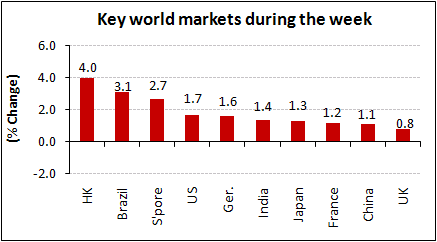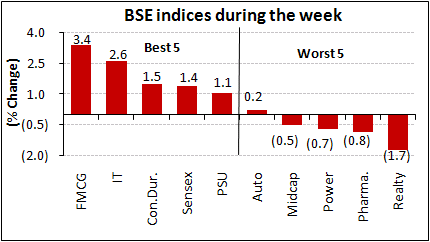- Home
- Todays Market
- Indian Stock Market News June 16, 2012
All eyes on RBI policy, Greek elections Sat, 16 Jun RoundUp
After witnessing one of the best weeks of the calendar year 2012 last week, stockmarkets worldwide continued their positive run this week as all of the major economies ended higher. Markets in Hong Kong, Brazil and Singapore were amongst the best performing markets this week, recording gains of about 3% to 4%. The US markets ended higher by 1.7% over the previous week. Global markets picked up during the second half of the week as investors grew more optimistic ahead of the crucial Greek elections this Sunday.
The Indian stock markets too ended the week with strong gains, with the BSE-Sensex, India's benchmark index, up by 1.4%. Similar to what was witnessed by the global markets, the Indian markets picked up during the second half of the week on hopes that the RBI, like central banks worldwide, is likely to take steps to contain damages in case Greece exits Eurozone. Amongst the other world markets, China and UK were up by 1% each during the week.
 |
| Source: Yahoo Finance |
The sectoral indices ended the week on a mixed note with stocks from the FMCG, and Information Technology spaces leading the pack of gainers this week. The BSE-FMCG and BSE-IT indices ended the week higher by 3.4% and 2.6% respectively. Amongst the top underperformers were stocks from the realty and pharmaceuticals sectors. While the BSE-Realty Index ended lower by 1.7%, the BSE-Healthcare Index ended lower by 0.8%.
 |
| Source: BSE |
Let us now take a look at key sector news during the week. There was a lot of action in the auto sector this week. But most of it was related to the diesel related issues. Given the substantial gap between the price of petrol and diesel, the demand for vehicles using the latter has increased substantially over the last year. With the same happening, auto companies focused more producing such vehicles. A leading business daily has now reported that a now the demand for diesel cars has reduced given the relatively high base effect as well as higher taxes making cars more expensive. The overall pessimistic sentiments have also not helped matters as well.
As compared to earlier, when the waiting periods for some of the popular models were high, vehicles now are believed to be available off the shelf. It is reported that eight of the twelve top selling diesel cars are now available off the shelf. In fact, car dealers are even now offering incentives to purchase such vehicles, which was not the case earlier. What will be more interesting to see is how the industry will perform after the increase in special tax on diesel vehicles, which the government is mulling at the moment.
Now let us take a look at a few corporate events that unfolded during the week. It is reported that State Bank of India (SBI) reduced its loan rates for the agriculture and small & medium enterprise (SME) sectors by 0.5% to 3.5%. These move, which have been effective from the starting of this month, has been aimed at pushing the credit off take just a few days before the RBI's mid-quarter monetary policy review. The bank however, did add that the interest rate on retail loans have been untouched.
In other news, Ultratech Cement and France's Lafarge are reportedly in talks to buy Jaiprakash Associates' cement units in two states. This deal is potentially worth up to about US$ 1.6 bn, according to a leading business daily. Preliminary talks have been concluded and final bids are expected shortly. Jaiprakash had earlier has spun off its cement units in Gujarat and Andhra Pradesh into a separate company, Jaypee Cement, which has a combined capacity of 9.8 million tonnes. The business could be worth about Rs 90 bn, based on an estimated cost of US$ 160 a tonne for a greenfield plant. Swiss cement maker Holcim, which has stakes in two large Indian cement companies ACC Ltd and Ambuja Cements is also believed to be in the race.
Moving on, Tata Power, the country's largest private power producer has plans to build more projects based on imported coal. However, this is subject to the government formulating the proper policy framework for sourcing coal from overseas mines. The company is still looking for clarity on imported coal from the government. It has recently commissioned a 4,000 mega-watt (MW) ultra mega power project at Mundra. The coal for this project is currently being sourced from Indonesia. However, Indonesia had decided in September 2011 to adjust its pricing policy to bring the prices of its coal at par with international prices. This move made sourcing coal from Indonesia an expensive proposition. The company has another project at Dherand which is also based on imported coal.
| Company | 8-Jun-12 | 15-Jun-12 | Change | 52-wk High/Low | |
| Top gainers during the week (BSE-A Group) | |||||
| Tulip Telecom | 86 | 102 | 18.6% | 167 / 70 | |
| India Cements | 73 | 81 | 11.6% | 119 / 62 | |
| Ambuja Cement | 151 | 168 | 11.1% | 182 / 120 | |
| GVK Power & Infra | 13 | 14 | 10.8% | 23 / 10 | |
| NCC | 34 | 37 | 10.5% | 87 / 28 | |
| Top losers during the week (BSE-A Group) | |||||
| Sterling Biotech | 7 | 6 | -11.9% | 101 / 5 | |
| Adani Port & SEZ | 125 | 115 | -7.6% | 170 / 110 | |
| Godrej Industries | 249 | 231 | -7.3% | 284 / 168 | |
| Lupin | 546 | 514 | -6.0% | 574 / 410 | |
| Unitech | 23 | 22 | -5.7% | 38 / 17 | |
Moving on to economy related news, during the early part of the week the ratings agency S&P's warned that India could become first of the BRIC nations to have a non-investment grade rating. Slowing GDP growth and political roadblocks to economic policymaking were cited as the key reasons behind the warning.
The spate of bad news just doesn't seem to come to an end for India. During the week, the Index of Industrial Production (IIP) were announced as well. While the declining trend was reversed in April 2012, after a 3.5% downfall in the previous month, IIP grew by a dismal 0.1%. The stagnation in the monthly output has been on account of a 3.1% contraction in mining output and a sluggish 0.1% rise in manufacturing. However, the electricity produced was higher by 4.6%. The slowdown is also reflected in the sliding production of intermediate goods and capital goods that fell by 1.4% and 16.3%, respectively in April.
Further, the inflation numbers this week were again disappointing. India's wholesale price index (WPI) rose in May to 7.55%, keeping price pressures elevated. The reading was 7.23% in April, and the increase was on account of higher food and fuel prices. This leaves the Reserve Bank of India (RBI) with the tough task of trying to balance growth, which has reached a nine year low and stubbornly high inflation. Plus the country has to be steered away from a cut in its rating outlook to junk status. However as core inflation is (excluding the volatile components of food and fuel) is still below 5%, there is still hope that the central bank may cut rates in its policy review, which is scheduled of the early part of the next week. The repo rate of 8% is the highest policy rate among major Asian economies. The RBI cut the repo rate by 0.5% in April as slowing growth outlook became a major concern and it is widely expected orchestrate further monetary easing. However there are still a number of issues at bay including supply bottlenecks and a less than normal monsoon to start off the season.
For information on how to pick stocks that have the potential to deliver big returns, download our special report now!
Read the latest Market Commentary


Equitymaster requests your view! Post a comment on "All eyes on RBI policy, Greek elections". Click here!
Comments are moderated by Equitymaster, in accordance with the Terms of Use, and may not appear
on this article until they have been reviewed and deemed appropriate for posting.
In the meantime, you may want to share this article with your friends!